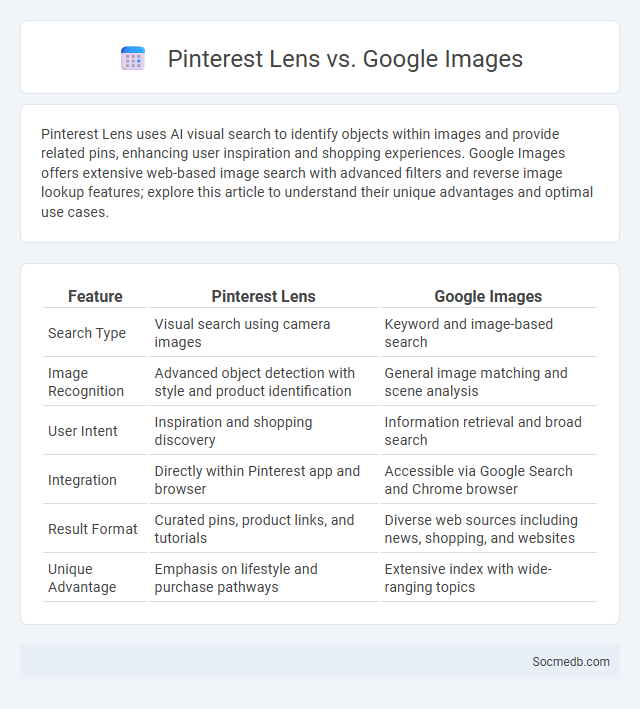
Photo illustration: Pinterest Lens vs Google Images
Pinterest Lens uses AI visual search to identify objects within images and provide related pins, enhancing user inspiration and shopping experiences. Google Images offers extensive web-based image search with advanced filters and reverse image lookup features; explore this article to understand their unique advantages and optimal use cases.
Table of Comparison
| Feature | Pinterest Lens | Google Images |
|---|---|---|
| Search Type | Visual search using camera images | Keyword and image-based search |
| Image Recognition | Advanced object detection with style and product identification | General image matching and scene analysis |
| User Intent | Inspiration and shopping discovery | Information retrieval and broad search |
| Integration | Directly within Pinterest app and browser | Accessible via Google Search and Chrome browser |
| Result Format | Curated pins, product links, and tutorials | Diverse web sources including news, shopping, and websites |
| Unique Advantage | Emphasis on lifestyle and purchase pathways | Extensive index with wide-ranging topics |
Introduction to Visual Search Technologies
Visual search technologies revolutionize how you discover content on social media by enabling searches through images instead of text. These advanced algorithms analyze visual elements like colors, shapes, and objects to deliver accurate and relevant results. By integrating AI and machine learning, social media platforms enhance user experience and streamline content discovery through visual search.
Overview of Pinterest Lens
Pinterest Lens is an advanced visual search tool that allows users to discover ideas by capturing images through their smartphone camera or uploading photos for analysis. Leveraging deep learning algorithms, it identifies objects within the image and delivers relevant pins, products, or DIY tutorials tailored to the user's interests. This innovative feature significantly enhances user engagement by transforming everyday visuals into actionable and personalized content on Pinterest.
Features of Google Images
Google Images offers advanced search filters that allow you to refine results by size, color, type, and usage rights, enhancing your ability to find the perfect image quickly. Its reverse image search feature enables you to upload an image or paste a URL to discover its origin, related content, and visually similar images. These capabilities make Google Images a powerful tool for social media content creators seeking original visuals and inspiration.
Exploring Google Lens
Google Lens leverages advanced image recognition technology to transform social media interactions by enabling users to search and discover information directly from photos and videos. Integrating Google Lens with platforms like Instagram and Snapchat enhances content engagement through real-time object identification, text translation, and shopping features. This innovation drives user interaction by blending visual search capabilities with social sharing, optimizing both user experience and digital marketing strategies.
Image Recognition Capabilities Compared
Image recognition capabilities on social media platforms vary widely, with AI algorithms analyzing millions of posts daily to identify objects, faces, and contexts. Platforms like Facebook and Instagram use advanced neural networks to enhance user experience by suggesting tags, improving content moderation, and personalizing feeds based on your visual interactions. These sophisticated technologies continuously evolve, driving richer engagement and more accurate content analysis.
User Experience and Interface Differences
Social media platforms vary significantly in user experience (UX) and interface design, influencing how users interact and engage with content. Visual-centric platforms like Instagram emphasize seamless image browsing and intuitive touch gestures, while text-based platforms such as Twitter prioritize quick readability and concise navigation. Your preferred social media experience depends on interface simplicity, content layout, and personalized interaction features that enhance engagement.
Integration with Ecosystems
Social media platforms increasingly enable seamless integration with diverse digital ecosystems, enhancing user experience through interconnected apps and services. APIs and third-party tools facilitate cross-platform sharing, real-time data exchange, and unified content management, driving greater engagement and brand consistency. This ecosystem integration supports advanced analytics, personalized marketing, and streamlined communication across social networks and e-commerce platforms.
Accuracy and Search Results
Accurate information on social media significantly enhances the quality of search results by filtering out misinformation and promoting trustworthy content. Search algorithms prioritize verified data and credible sources to ensure users find relevant and reliable answers quickly. Your engagement with accurate posts contributes to a healthier digital ecosystem and improves future search experiences.
Privacy and Data Usage
Social media platforms collect vast amounts of personal data, including location, behavior, and preferences, raising significant privacy concerns for users. Data usage often extends beyond core services, involving targeted advertising and third-party sharing, which can lead to unauthorized access or misuse. Implementing strong privacy settings and understanding data policies are crucial steps for protecting personal information in digital environments.
Which Visual Search Tool Is Best?
Pinterest Lens stands out as the best visual search tool by leveraging advanced image recognition technology to identify objects within photos and suggest related pins instantly. Google Lens offers comprehensive integration with Google's ecosystem, enabling users to search for products, translate text, and identify landmarks through a seamless visual interface. For fashion and retail, ASOS Style Match excels by allowing users to upload images and find similar clothing items quickly, enhancing online shopping experiences.
 socmedb.com
socmedb.com